
“Ten years later, it is the same core idea,” says Fatma Al-Remaihi, CEO of the Doha Film Institute (DFI), which this week wrapped the 10th edition of its Qumra talent development event and project incubator.
“We wanted a place where filmmakers would be inspired and be able to progress their films - and to make sure that their projects are finished.”
This year’s edition welcomed 200 industry professionals to Doha from March 1-6, while another 100 will participate in the online adjunct from March 9-11. With all attendees staying in the recently-revamped Msheireb district, recreating a convivial atmosphere was a key success of this year’s event.
“We really wanted the human connection,” says Al-Remaihi. “We said from the beginning that there would be no red carpet, no competition. We wanted people to be relaxed. They work with each other, and they live with each other [in] a dorm-like situation where they are doing things all the time together.”
Intimacy is a defining quality for Qumra: a deliberately small-scale affair with a focus on supporting emerging and underrepresented filmmakers.
Hanaa Issa, Qumra deputy director, says this allows the curation to flourish. “These projects are not just projects that apply to a market event,” she says of the selection of titles profiled at Qumra, which this year numbered 24 features. “We are intimate with our filmmakers and projects - and it’s the same thing with the mentors we invite. When people’s itineraries are built, they are not left to chance. They are curated and match made.”
Palestinian filmmaker Elia Suleiman, artistic advisor to the DFI, says he no longer gets first-night nerves, 10 editions in. “The anxiety has subsided completely,” says Suleiman, who felt like “a premature headmaster of an elementary school,” in the inaugural edition. “The fact that it is 10 years speaks for itself. So many filmmakers came out of this place. So things have worked out.”
Seven titles in official selection at this year’s Berlinale received DFI support, including two Competition films: Meryam Joobeur’s Who Do I Belong To, and Min Bahadur Bham’s Shambhala, the first Nepalese film in Berlin’s flagship section.
Buzzy titles at this year’s Qumra included Mehdi Barsaoui’s picture-locked Aicha, a drama about a young woman in Tunisia, and Naseem, Fight With Grace, Ana Naomi De Sousa’s work-in-progress feature doc about British-Yemeni boxer Naseem Hamed.
Personal visions
At the opening of this year’s edition, Al-Remaihi called for an immediate ceasefire to the “genocide in Gaza”. Several filmmakers at this year’s event are making films that deal with conflict, including Mohammad Alchikho’s The Dream Betrayed Me, a Syria-set drama about a fake hero in a real war.
Al-Remaihi says Qumra is all about providing filmmakers with a space to tell their stories freely - and not to be silenced. “As an Institute in the Arab region, one of our missions is to give Arab filmmakers opportunities to tell their stories the way they want, not how anybody dictates to them. We are very proud to be in a place where we have a mix of filmmakers from all over the world, coming with their stories, with their backgrounds, issues and causes, whether it’s about their country, people or their family. They’re free to do it.”
“We are more concerned with personal visions than we are concerned with politicising the image,” adds Suleiman. “Of course, it is going to be a very political image but it has to have an artistic value.”
Al-Remaihi believes the Arab region has been “misrepresented for decades in the media” and Qumra provides a “space to show the world that basically we’re the same; we’re not different from you. We have hopes and dreams and fears and ambitions. We’re regular people like everyone else. Now, more than ever, with everything that is happening and with voices being oppressed everywhere, people can come here and tell their stories - tell the truth through their films and through the support of the Institute.”
“It’s not just from Palestine. It’s from everywhere else - Yemen, Lebanon, Myanmar - so many countries where the filmmakers need to tell their stories.”
When regional broadcasters and platforms increase their investment in original content, Issa believes more filmmakers will show an interest in making series as well as feature films. “With a lot of the series we have been preserving, nothing really big has materialised yet…[but] it’s going to happen. It is a matter of time.”
The number of applications received by the DFI has also increased across the 10 editions. “The barriers to making films are lower,” says Issa; although the DFI has maintained its focal point. “I don’t think there are a lot of projects that get made in the region that don’t apply at some point to the DFI, whether for grants, other funding programmes or through the Labs.”
“It’s like we’re gardening,” says Issa of the DFI ecosystem. “We are planting these seeds and - sometimes right away or years later - things blossom.”






![The Brightest SunScreen[Courtesy HKIFF]](https://d1nslcd7m2225b.cloudfront.net/Pictures/274x183/3/5/0/1448350_thebrightestsunscreencourtesyhkiff_312678.jpg)


















No comments yet